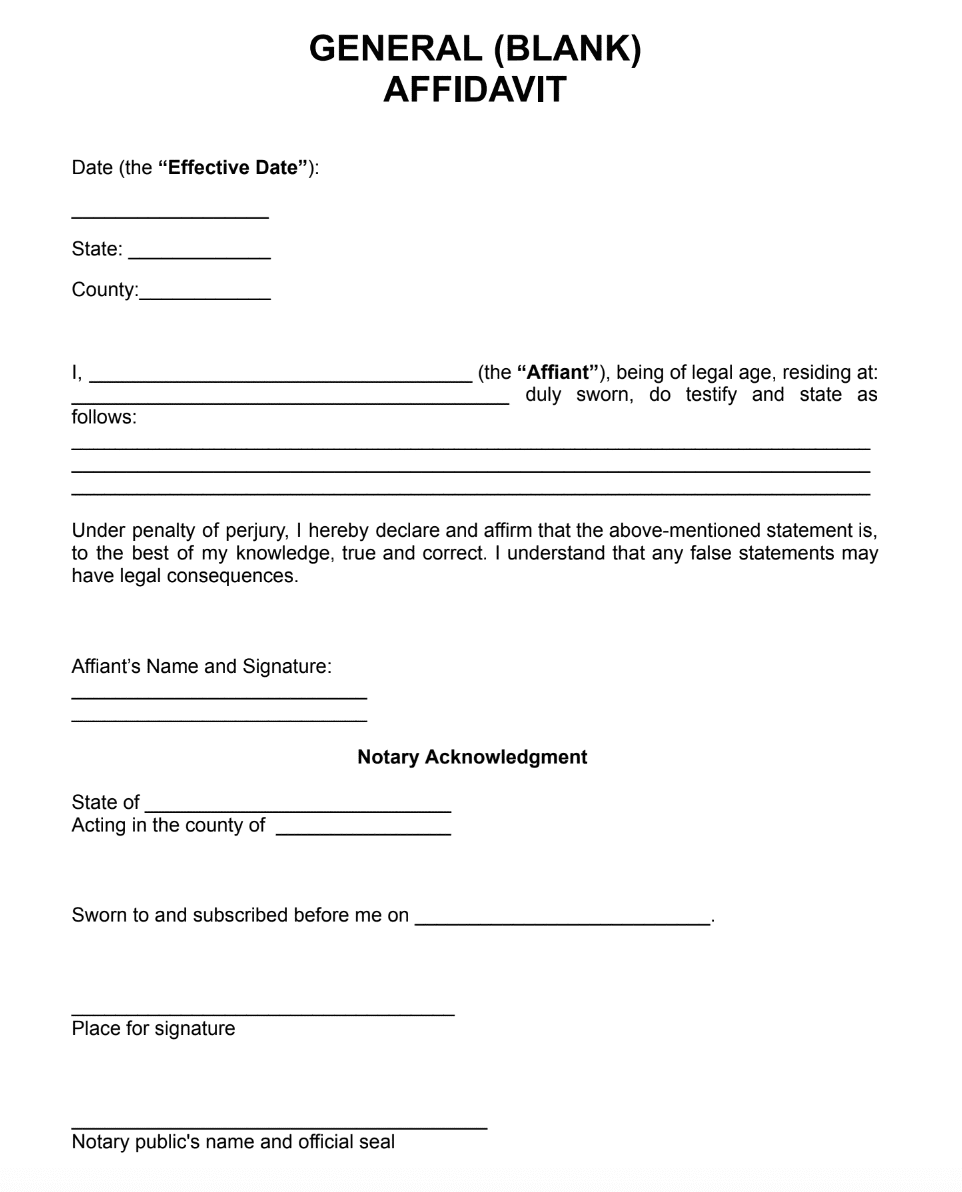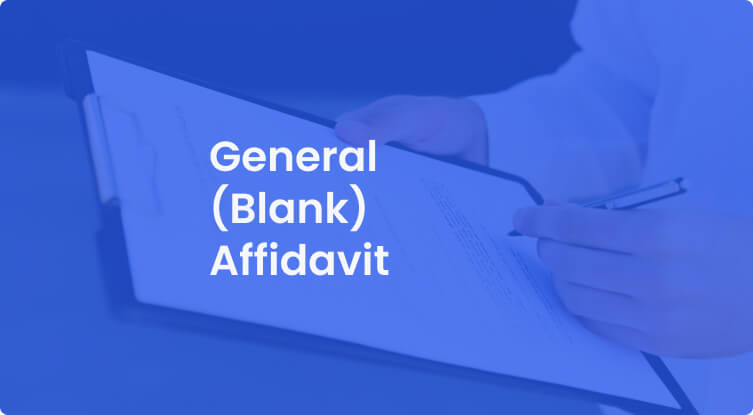 Preview
Preview

An affidavit is a legal document confirming the truth of a specific statement. This document, also known as a “general affidavit” form, is used in court or business deals as proof that can be legally checked.
Due to its significance and wide application, understanding the structure and utilization of a general affidavit template is critical for anyone participating in legal or commercial activities.
An affidavit is a flexible legal document that may be used for various purposes and situations. The blank affidavit form showcases its adaptability, as it can be modified depending on the context and the specific need. Here are some key types of general affidavits:
Each affidavit, while tailored to specific contexts and needs, carries the essential purpose of affirming the truthfulness of a statement. The diverse types of affidavits include:
In both the letter of affidavit and the general affidavit, you make a legal commitment to the truth of what you state. They are applied differently, though.
A letter of affidavit is a written statement of particular facts. It’s used when the person making the statement wants to vouch for specific details. The affidavit letter often addresses a single matter; this might be a particular incident, an informational check, or the legality of specific papers.
In contrast, a general affidavit is more flexible. It doesn’t have a set structure for a particular circumstance or claim. Rather, it offers an editable template that may be filled out per one’s requirements. Its adaptability makes it helpful in various situations, such as court cases or financial transactions. A free affidavit form can facilitate the creation of a document that fulfills your specific needs and is legally sound.
| Type | Letter of Affidavit | General Affidavit |
|---|---|---|
| Purpose | Used to affirm specific facts or circumstances related to a particular issue | Used to affirm a variety of statements due to its flexible nature. |
| Format | Targeted and specific, addressing a particular circumstance or event. | Blank format, allowing it to be filled out as per specific requirements. |
| Use cases | Supporting residency, minor's consent for travel, verifying information, etc. | Court proceedings, financial transactions, business deals, etc. |
| Flexibility | Less flexible. The content is usually specific to the situation at hand. | Highly flexible. The affiant can customize it based on their needs. |
| Legally binding | Yes. The affirmed facts are considered truthful and may have legal bearing. | Yes. The affirmed facts are considered truthful and may have legal bearing. |
An affidavit, which can easily be prepared using an affidavit template Word format, is used in many legal and personal contexts. By putting specific information under oath, an affidavit makes it official and trustworthy. It is, therefore, reliable in a court of law. The following are typical circumstances in which an affidavit might be used:
An affidavit, which can also come in the form of an affidavit sample letter, involves two leading roles: the “affiant,” the person who provides the statement, and the “notary public,” the official who confirms the affiant’s statement.
Use a printable affidavit template Word format to draft your statement. Key terms commonly found in an affidavit include:
Making a sample affidavit requires careful attention to detail to guarantee that all crucial information is included and accurate. Here is a simple guide to assist you:
Step 1: Identify the affiant
Start by writing the full legal name of the person who will make the official statement. Also, include the address of the affiant.
Step 2: Detail the sworn statement
In this section, you need to list the confirmed facts. This is the ‘truth statement’ that will be confirmed under oath. When looking for an affidavit form, PDF template is also an option. Ensure the data is accurate, easy to understand, and brief.
Step 3: Reference any exhibits
If the affidavit mentions specific documents for proof, label them clearly, like “Exhibit A,” “Exhibit B,” etc., and attach these to the affidavit.
Step 4: Affiant’s signing
The affiant completes a general affidavit template, affirming the accuracy of their statement, and signs the paper in the presence of a notary public. It’s crucial not to sign the paper until the notary is present with you.
Step 5: Notary validation
The notary public will verify your identity, watch you sign the paper, and add their signature and notary seal to confirm everything was done correctly.
Step 6: Safe storage
Keep the official affidavit, or the general affidavit form PDF, safe or hand it over to the person who requested it, depending on the purpose of the affidavit.
Finding a notary public to certify your document in the United States can be straightforward. Here are some ways to do it:
In short, an affidavit helps confirm facts in legal and business situations. Knowing about its types, purpose, terms, parties, and the creation process enables you to be prepared and have the upper hand when verifying the truth. A ready-to-use affidavit template makes it easier for anyone who needs to state a fact officially.
 Preview
Preview
